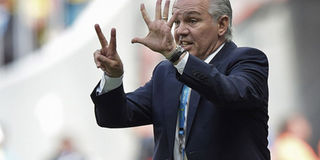Humble coach with a meticulous eye for tactical details: Sabella

PHOTO | JUAN MABROMATA Argentina's coach Alejandro Sabella gestures during a quarter-final football match between Argentina and Belgium at the Mane Garrincha National Stadium in Brasilia during the 2014 FIFA World Cup on July 5, 2014.
What you need to know:
- Sabella the player, much like the manager, was a modest professional and after an early career breakthrough at River Plate found himself in the unusual surrounds for an Argentinian in the late 1970s of the English lower leagues with Sheffield United.
- In his first year the club from La Plata won the Copa Libertadores for the first time in 39 years in a not too dissimilar manner to the way La Albiceleste have battled their way to the World Cup final.
From Bramall Lane in Sheffield to a World Cup final in Brazil, Argentina boss Alejandro Sabella’s path to the most important game in world football wasn’t always paved with gold.
Sabella the player, much like the manager, was a modest professional and after an early career breakthrough at River Plate found himself in the unusual surrounds for an Argentinian in the late 1970s of the English lower leagues with Sheffield United.
Legend has it that the Blades had tried to sign a teenage Diego Maradona but found his asking price too high and opted for the cheaper option in Sabella instead.
However, whilst the 59-year-old might have been unable to emulate Maradona’s genius on the field, he has done a much better job of leading his country to the brink of a third World Cup triumph from the bench than Maradona managed four years ago.
Sabella’s agent Eugenio Lopez confirmed on Friday that Sunday’s final against Germany will almost certainly be his last game in charge of Argentina no matter the outcome.
His final task to succeed where Maradona failed in a 4-0 thrashing by the Germans in the quarter-finals in South Africa.
Buenos Aires sports daily Ole once described him as the antithesis to Maradona. An understated and humble coach with a meticulous eye for tactical details.
FREE-FLOWING ATTACKING FOOTBALL
After 15 years as assistant to Daniel Passarella in a variety of jobs including the Argentine and Uruguayan national teams, Sabella stepped out on his own two feet for the first time at Estudiantes in 2009 with almost instant success.
In his first year the club from La Plata won the Copa Libertadores for the first time in 39 years in a not too dissimilar manner to the way La Albiceleste have battled their way to the World Cup final.
Estudiantes conceded just two times in eight knockout round ties during their triumphant Libertadores campaign. Far form the free-flowing attacking force in qualifying that Sabella admitted made him “close my eyes and pray” whenever they had to defend, Argentina have kept four clean sheets in six games on route to the final and have yet to concede at all in 330 minutes of football in the knockout phase.
At the start of the tournament he was looked upon as merely a facilitator for the squad’s leading players, most notably Lionel Messi, after bowing to the demands of the four-time World Player of the Year to drop a 5-3-2 formation after just 45 minutes of the opening game against Bosnia and Herzegovina.
However, he has still managed to impose the control that he craves. He has admitted to preferring smart, hard working players to those with more technical ability but little game intelligence.





